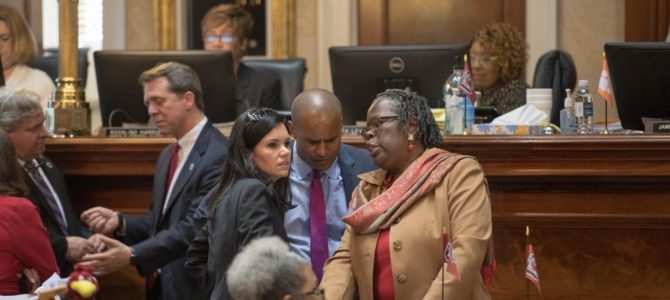Last Wednesday, South Carolina heard from Governor Henry McMaster in his annual State of the State address, followed promptly by House Minority Leader Todd Rutherford who provided the Democratic response.
Governor McMaster’s State of the State address was rife not only with false promises, but with recycled Democratic ideas as well. Representative Rutherford made sure to express his opinion on McMaster’s speech, and Rep. Rutherford had a lot to say.
Just weeks ago, the governor was lauded for introducing the idea of providing every four-year-old child in South Carolina the chance to attend full-day kindergarten. However, this idea was not new. In fact, as Rep. Rutherford mentioned in his response, universal 4K education is something that Democrats have been trying to pass for years, only for the idea to meet its demise in the hands of the Republicans. This is proof of what we all know by now: McMaster’s policy proposals are always just empty vows.
The governor followed this universal 4K pledge with a call for school choice, a policy that is widely supported by Republicans. It has been proven time and time again, though, that school choice is detrimental to those who live in poor neighborhoods and disproportionately harms minority groups. It’s clear that education has become a priority for the GOP, but only in that they prioritize their harmful agenda over what the state’s teachers and students actually want.
The governor expressed his concern about the welfare of children in South Carolina throughout his speech, yet he continues to ignore their futures. His current plan regarding the state surplus is to funnel it into tax rebates to save face. Rep. Rutherford made it clear that there is an incongruence in this plan, as the proposed rebates are merely a “gimmick” by the governor while our state social services have been operating at a deficit for years. Rep. Rutherford proposes we put the surplus towards something that actually helps South Carolinians and finally invest in our state programs.
Healthcare was a prominent talking point in the governor’s address, but only in terms of taking it away from women. Abortion bans like the one currently in the Senate have been struck down across the country, yet Governor McMaster plans to waste valuable time and resources in an attempt to fight an unwinnable court case, should the bill pass the Senate.
Even though the proposed ban would be repealed in the same fashion as those seen in other southern states, the fact that Republican legislators believe they should have total control over a woman’s choice should give every South Carolinian pause. Rep. Rutherford made sure to declare in his response that South Carolina’s elected officials should focus on supporting rural hospitals and expanding Medicaid across the state—things that would actually help their constituents, rather than harm them.
Rep. Rutherford’s response is based on one key idea: thinking big. He focused on larger issues that have been the root of the problems that South Carolina faces today. South Carolinians will not live prosperous lives while they are victims of institutional obstacles that exclude and suppress them. Rutherford made it clear that new legislation is needed to create fair voting opportunities for our people. It is easy for the governor to claim that South Carolinians are pleased with how the government is being run while he is also reaping the benefits of the unfair voting system in the state.
McMaster ends his State of the State address with unconvincing rhetoric that South Carolina is on the path to success, reiterating the same ideals that have been propagated in the state for years with no results. Rep. Rutherford puts us in a different direction. South Carolina still has a long path until it reaches its full potential, and its citizens should not support a system that decides what is good for us. We, the people, are the ones that know best.


